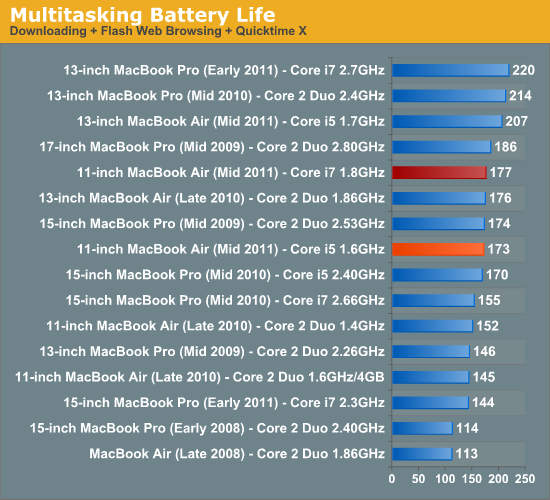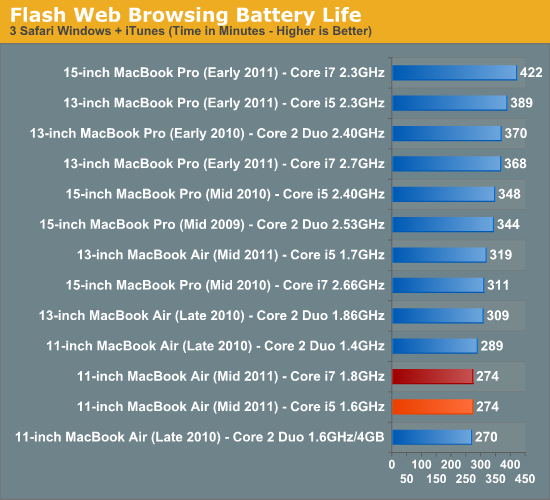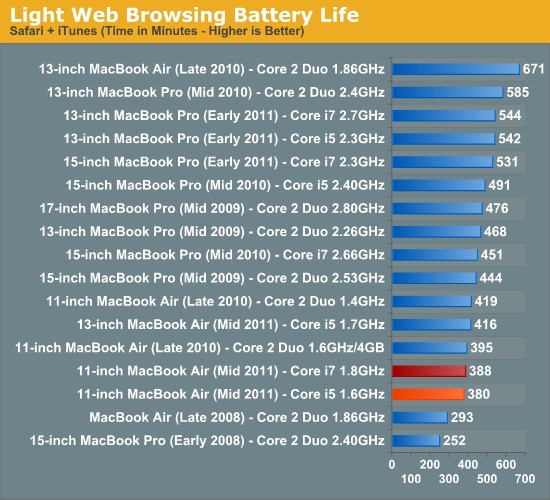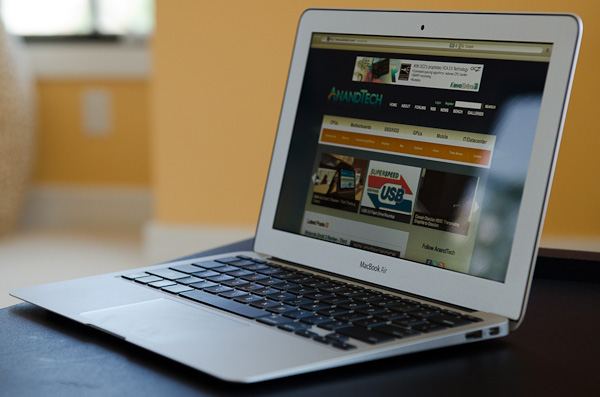Apple's 11-inch MacBook Air (Core i7 1.8GHz) Review Update
by Anand Lal Shimpi on August 1, 2011 6:08 PM EST- Posted in
- Mac
- Apple
- Intel
- Core i7
- Sandy Bridge
- MacBook Air
Battery Life
The 1.8GHz Core i7 doesn't run much faster by default than the 1.6GHz Core i5, but it can turbo up to a 25% higher clock speed than the Core i5. What's the impact on battery life?
If you're running a high CPU workload that never lets up in a continuous loop, the i7 is going to die quicker than the i5. Active power is greater at higher frequencies (assuming everything else remains the same) and with no chance to get to sleep the i7 will eat through the 35Wh battery faster than the i5.
Where the i7 stands a chance however is in workloads where you aren't running the CPU at full tilt all of the time. The i7 needs tiny, tiny, tiny fractions of a second of idle time to throttle down and go to sleep. It's in these sleep states that it'll draw very little power and avoid being a major consumer of that 35Wh (or 50Wh in the 13) battery. From the CPU's perspective, it wants to finish its work as quickly as possible so it can get back into its really low power idle states.
For workloads with balanced periods of load and idle time, the i7 should be able to at least equal the battery life of the i5. Short bursts of instructions can execute up to 25% faster on the i7, allowing it to go back to sleep that much quicker. Any energy expended from running at higher clock could be saved by spending more time at idle.
The other advantage is the larger L3 cache. A larger cache means a higher likelihood of finding data in that cache, which saves trips to main memory. Anytime you go off-chip for data the power penalty is tremendous. You have to fire up a powerful memory interface, drive requests back and forth over a high speed bus and actually pull the data from DRAM. The entire process is far more power intensive than just grabbing data from the CPU's on-die L3 cache. I wouldn't expect huge power savings from the L3 cache, but it's likely a net positive.
Our battery life tests are designed to run the gamut. Showing you the absolute best case use-your-notebook-as-a-typewriter light web browsing test to the get-stuff-done multitasking workload. I'd say most power users will see battery life similar to the worst case scenario, while mainstream users will be between that and the flash web browsing test. The writers in the crowd can shoot for the battery life in our lightest scenario if you really just spend your time in TextEdit.
All of our tests were run with dynamic brightness control disabled (panel brightness near 50% - we tried to equalize brightness across all systems) and the Macs were set to never go to sleep.
As you can see by the numbers below, there's basically no impact on battery life from the i7 upgrade. Note that none of these workloads keep the CPU pegged at 100% throughout the test. As I mentioned earlier, if you're going to be doing a long 3D render or compiling a very large project (multiple hours) you can expect worse battery life from the i7. Typical notebook usage models however shouldn't see much of a difference at all.
Multitasking Battery Life
In this test we have three open Safari windows, each browsing a set of web pages with between 1—4 flash ads per page, at the same time. We're also playing an XviD video in a window all while downloading files from a server at 500KB/s.

Flash Web Browsing
The test here has three Safari windows open, each browsing a set of web pages with between 1—4 animated flash ads per page, at the same time. Each page forwards onto the next after about 20 seconds.

Light Web Browsing
Here we're simply listening to MP3s in iTunes on repeat while browsing through a series of webpages with no flash on them. Each page forwards on to the next in the series after 20 seconds.












55 Comments
View All Comments
jsbruner - Monday, August 1, 2011 - link
Graphs on the performance page all show i5, should those be i7?Anand Lal Shimpi - Monday, August 1, 2011 - link
Correct - fixed :)vol7ron - Tuesday, August 2, 2011 - link
Nice article, considering purchasing my first Apple laptop to release some apps to the App Store. I'm going to give this (Air vs Pro) some more thought, since other than XCode, I probably won't be using it.Jamezrp - Monday, August 1, 2011 - link
So the i7 is a huge difference...glad I picked up that over the i5. I still got much higher numbers with Cinebench 10 than you Anand, and I'm not really sure why. Were you running any other applications when testing? I ran Win7 Ultimate on a fresh install, with 150GB dedicated to Windows. And it was a 256GB hdd, if that makes any difference.Also, all the charts show the i7 chip as an i5.
Jamezrp - Monday, August 1, 2011 - link
Oh, and my scores can be seen here, just scroll down to the charts: http://www.gadgetreview.com/2011/07/apple-macbook-...Anand Lal Shimpi - Monday, August 1, 2011 - link
You're testing under Windows 7, I'm testing under OS X :)Cinebench 10 under Windows 7 is faster than OS X, Cinebench 11.5 is relatively similar between OSes.
KPOM - Monday, August 1, 2011 - link
Thanks for the update, and with 3 days left in my 14-day return window, you have validated my decision to go with the Core i7 in my 11". I was wondering about the heat and battery life differences, and it appears they are about the same with either processor, but with a noticeable edge in performance to the i7.Also, I lucked out with a Samsung SSD. I have the LG display, but it has never bothered me. I had the 11" 2010 model with a Toshiba drive and LG display, so perhaps I was already used to the viewing angles.
Thanks for the effort. Another good review.
dagamer34 - Monday, August 1, 2011 - link
Looking at a lot of graphs in this points continually show one subtle thing, the days of the 13" MacBook Pro are numbered. At this point, there is no way I would even think to consider that laptop seeing as how the 1.8 Ghz CPU performs well against the 2.3/2.7 Ghz CPUs. CPUs are rarely pegged at 100% anyway in typical usage.My hope is that Apple extends this concept with a 15" MacBook Pro with an Air-styled body. Ditch the optical drive. Ditch rarely used ports and move all but the most necessary ports to a Thunderbolt dock. Switch from a standard 2.5" storage drive to a slimmer model to save space.
It'd be perfect. The new 15" MacBook Pro. 3.9lbs. "All the speed, none of the weight"
AssBall - Tuesday, August 2, 2011 - link
Yeah, It would sure suck to hurt yourself lugging around all of that weight......
Rasterman - Wednesday, August 3, 2011 - link
I totally agree but the only thing that sucks for me is the lack of dedicated ethernet port. I still plan on replacing my old macbook with an air though. I need a dedicated port because I do xcode development and files are over the network, when compiling each time xcode must check all files, over wireless compile time is like 1-2 minutes, but when using ethernet the time is less than 10 seconds, its a huge difference. With the air I can still use a USB to ethernet adapter though, or a thunderbolt to ethernet adapther when they come out.